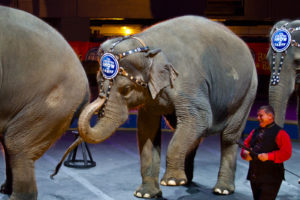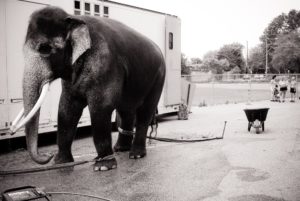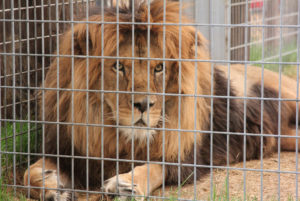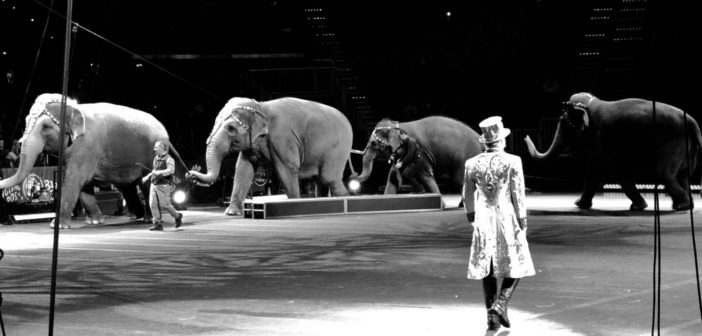Huge progress is being made for performing animals in the United States, as Hawaii just became the second state to ban exotic animals in circuses. The only other state to enact a complete ban on exotic animal acts is New Jersey, while Illinois and New York forbid the use of elephants in performances. More than 135 towns and cities across the U.S. have passed legislation to address circus cruelty, while the states of Rhode Island and California have banned the use of bullhooks to control performing animals.
A potential circus ban has been a hot button issue in the state of Hawaii ever since the tragic death of Tyke the elephant in 1994. Tyke was a wild-born African elephant, captured in Mozambique when she was just a baby. She was sold into the circus industry in the U.S. and abused and exploited for twenty years. Tyke was tortured during her time in the circus, as she was forced to work long hours wearing a clown costume, dancing for the audience, and riding a giant tricycle.

Elephants and their trainer in a Ringling Bros. and Barnum & Bailey Circus in Lexington, Kentucky. Image credit Arthur T. LaBar, CC BY-SA 3.0.
In August 1994, Tyke spent several days locked in the hull of a tanker ship on a long ocean journey from California to Hawaii. When they finally let her out she was immediately forced to perform in front of an audience. Unable to take the abuse any longer, she snapped and killed her trainer by stomping on him repeatedly. She also seriously injured her groomer, then busted through a locked door and a chained metal gate and ran out onto the street.
Tyke ran for her life through the streets of Hawaii for over half an hour. Unable to calm the elephant, local police eventually opened fire and shot her over 80 times before she fell to the ground. She then lay in the street in a pool of blood for over two hours, until she finally bled to death. The state of Hawaii then vowed to completely ban the use of exotic animals in circuses, and now over two decades later they have followed through with that promise.

An restrained elephant awaits performance night at a circus in Barrie, Canada. Image credit JoAnne McArthur / We Animals.
I would like to extent my gratitude to Hawaii Governor David Ige for signing this historic legislation, but I also wonder what took so long. Why did we have to wait almost 25 years after the horrific death of Tyke the elephant for Hawaii to ban exotic animals in circuses? What were the politicians doing all this time? They were arguing back and forth, they didn’t have enough votes to pass a bill, they couldn’t get the governor’s signature, and so on.
New Jersey and Hawaii becoming the first states in the entire U.S. to ban the use of exotic animals in circuses is big progress, but that still leaves 48 more states where the cruelty continues. We can no longer stand by as animals are tortured and exploited for human greed and entertainment. Even if we have to take this battle sate-by-state, we must speak out for these animals, who have no say in how they are forced to live their lives.

A male lion is confined between circus performances. Many animals like him are currently being held in similar conditions in circuses across the United States. Image credit TreasureLA, CC BY-SA 3.0.
Let’s be honest: wild animals do not belong in circuses, just as no animal does. They have to endure horrific abuse in order to “train” them to perform. Then the cruelty continues every day of their lives as they are dragged around from one location to another. They are deprived of everything that is natural to them, and they are forced to lead tragic lives of constant stress and abuse.
As heartbreaking as Tyke’s story is, there are still hundreds of animals suffering in the circus industry across the United States. We need all other states and countries around the world to step up and speak out for these animals. If you ever hear of a proposed circus ban in your city, state, or country please contact your elected officials and urge them to sign the ban into law.
The Unites States cannot allow this cruelty and abuse to persist for human selfishness and greed. Please join me in advocating for the remaining 48 states in the U.S. to finally ban exotic animal acts. These wild animals belong in sanctuaries, where they can live out the rest of their lives in peace and dignity. Tyke the elephant never lived to see sanctuary, but hundreds of other animals still have that chance. Rest in peace beautiful Tyke, and may your soul enjoy eternal freedom.
Featured image: Elephants are forced to perform in a circus. Image credit Tom Driggers, CC BY-SA 3.0.






1 Comment
Finally both wild and domestics are being banned from circuses! Hopefully this is part of a revived movement to free all!
The two newest victories come from Windsor, Ontario and the country of Italy. They will ban all animal acts! Sault Ste. Marie city council voted in 2017 to extend circus animal ban to horses and dogs. Shows featuring wild animals have been banned in the Sault since 2012.
http://www.cbc.ca/news/canada/sudbury/sault-ste-marie-circus-animal-ban-1.4156912
Lifeforce’s circus investigations first led to a ban on of all animal acts in circuses in two cities in British Columbia, Canada (1980s). However another Vancouver organization got involved and compromised for only “wild” animals in Vancouver. Lifeforce even had a prominent Shriner agreed that horses and dogs had suffered. Horses were pulled to ground to be repeatedly kicked and whipped. They were bleeding too. Also a dog’s leg was probably broken jumping through a hoop. The circus quickly hid the dog.
But the backroom dirty deed that compromised animal protection was done in Vancouver. Then many cities sold out the “domestics”. Many abuses continued with horses, dogs and birds! And most of the times the wild animals were just kept in the travel trailers.
We were ahead of the times back in the 80s. Based on my investigations of the circus in Burnaby, Canada, I alerted Rick West of the Victoria SPCA. He got veterinarian Ken Langelier to inspect them. He concurred with my findings such as the numerous wounds on the horses. That led to ban on all species in Saanich, BC then Victoria, BC.
We must stop all wild and domestic animal acts! They all suffer! More “domestics” will continue to be abused if “wild” acts are only stopped!